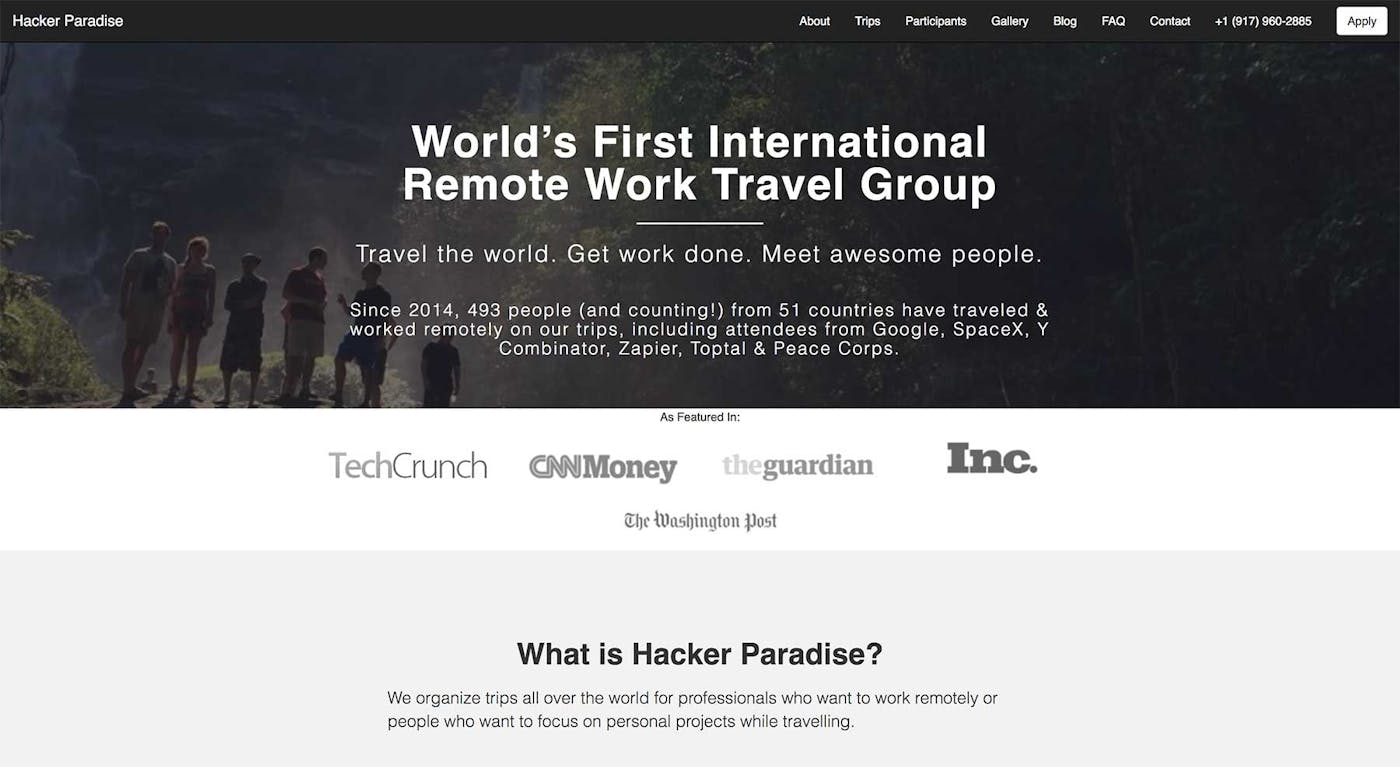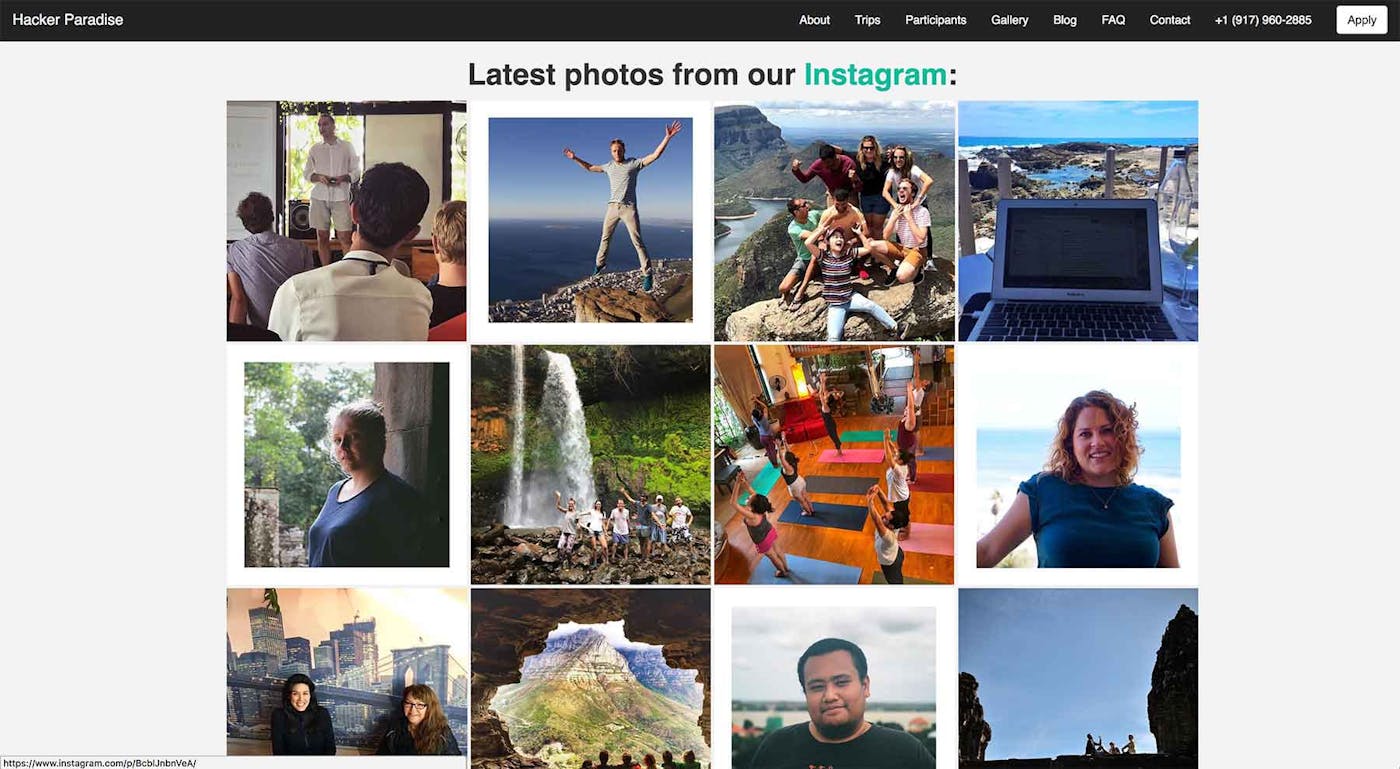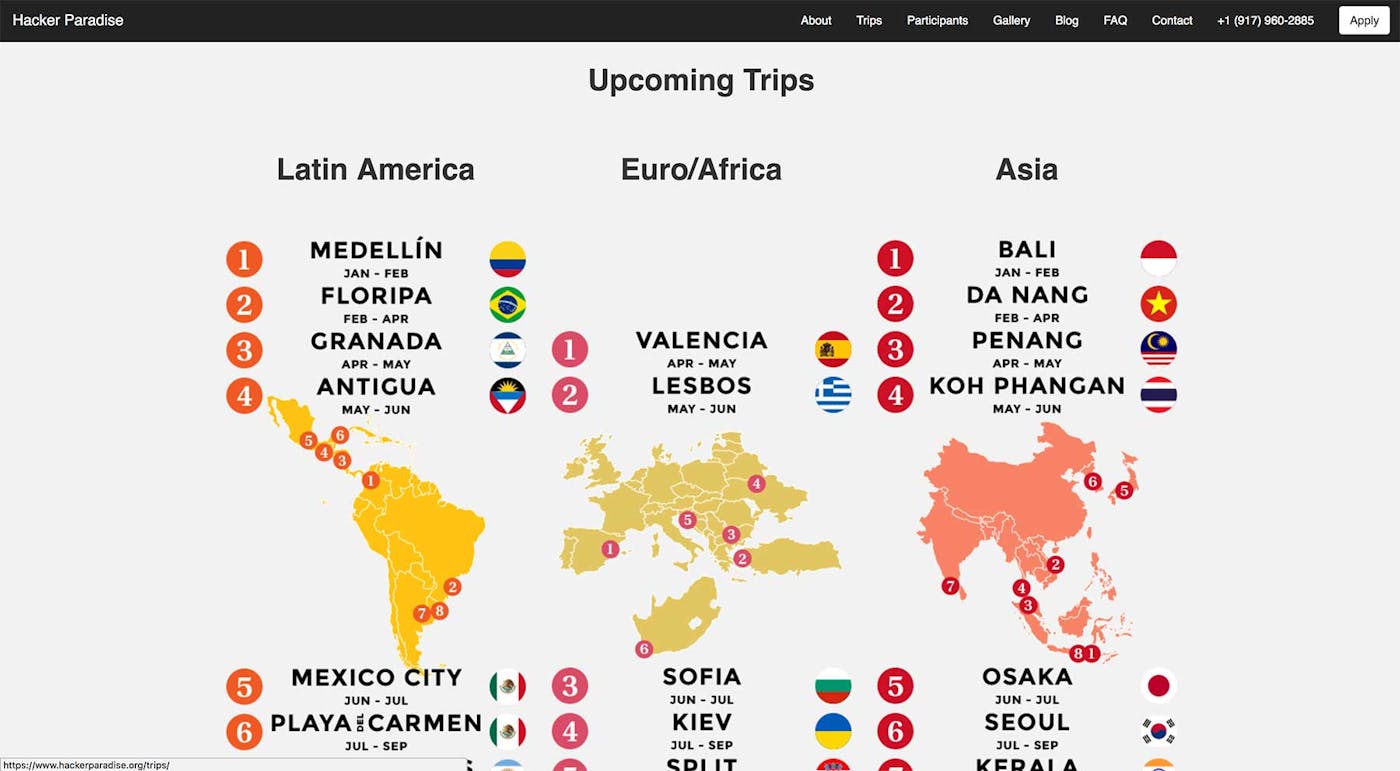Turning a Programming Retreat into a $35,000/mo
Business
What's your background, and what are you working on?
My name is Casey Rosengren, and I've been running Hacker Paradise for the past three years. We organize trips around the world for creative people who want to work remotely while traveling.
We started in the fall of 2014 as a side project, and since then 400+ people have joined our community, including Y Combinator, Google, and Peace Corps alumni. You can check out some of them here.
People join our trips so that they can go to beautiful locations and still have access to a thriving tech community. We handle the logistics (housing and workspace) and manage the community (interviewing applicants, organizing social events, meetups, hackathons, etc.).
We're fully bootstrapped and currently have 150-200 people per year join our trips.
Before Hacker Paradise, I was a student and freelance web developer. I also started a number of companies while in college.

What motivated you to get started with Hacker Paradise?
During college, I took a year off to work on an e-commerce startup with a friend. We made a number of classic first-time entrepreneur mistakes, and after a year we decided to shut down the company. I went back to school, finished my degree, and started interviewing for jobs at different startups.
The whole experience left me feeling pretty burnt out on tech. While working on the startup, I'd lost touch with the intrinsic joy of building things for their own sake, and I'd been focusing on work to the point where I was neglecting my personal health.
I felt like getting back into the startup world would just continue that trend, and after spending some time reflecting I realized that what I really wanted to do was travel for an extended period and work on just-for-fun side projects.
So that's what I did. I picked up some freelance web development work and I emailed a bunch of hotels in Central America to see if they'd give me room and board in exchange for web and marketing help. I heard back from a hotel in Costa Rica, and I started working with them to promote yoga retreats during the country's low season.
However, right after we started the project, someone stole their yoga instructor's laptop, and she decided to leave Costa Rica for her native England. All of a sudden, there was no more work for me to do, and it looked like I was going to have to cut my stay there short.
I still wanted to hang out in Costa Rica, so I pitched the hotel owner on bringing a group of developers to his hotel for a "programming retreat." Occupancy rates are low in hotels during the off-season, and the idea was that we could fill his hotel for a few months when it would otherwise be empty. We threw together a landing page and started taking sign-ups. Around this time, my co-founder Alexey came on board.
It turned out there was quite a bit of interest in what we were doing — 30 people came on our first trip, and Hacker Paradise was born! People had such a great time that we decided to keep doing it, and to turn it into a sustainable business. We also decided to open up the community to designers, entrepreneurs, and other non-technical creative types.
In the beginning, it really was a way for us to scratch our own itch. We were excited to be traveling to these beautiful places, and Hacker Paradise provided the stimulation and opportunities that come from being surrounded by really smart and creative individuals. It was like having a pop-up tech community wherever we went.
It also blows my mind that the whole company spawned from serendipity. If that yoga instructor hadn't had her laptop stolen, you might be interviewing me today about some niche yoga retreat business instead of Hacker Paradise.
What went into building the initial product?
Since we already had a hotel on board, it was super simple to build the initial "product."
I put together a simple landing page using a free Bootstrap template from BlackTie (highly recommended). We took applications through Google forms, and used YouCanBookMe to schedule interviews. I think it took us a week from having the idea to putting up the website and beginning to share it around the web.
A lot of our initial applicants came from Meetup and other online tech communities. At the time, there really was nothing like us out there, so when we reached out people were pretty receptive.
I think it also helps that in the beginning, we were just a side project. We were offering the trip at cost (people paid the hotel directly), so when we reached out to a Meetup, the pitch was really informal. It was like, "We're doing this cool thing in Costa Rica that we're not making any money on, and we're looking for other awesome people in tech to hang out with. Want to join?"
Later on, it became a business, but the first trip was more of a grassroots community initiative.

How have you attracted users and grown Hacker Paradise?
Meetups were quite useful for spreading the word about our first trip. We posted to a bunch of mailing lists and discussion boards for tech-related groups in major cities around the world. That, our personal networks, and some moderate success on Hacker News filled our first trip.
On our second trip, we reached out to journalists, and that's when we got covered by The Guardian. Eventually, we also got covered in TechCrunch, CNN, and the Washington Post. The later press coverage actually came from being friendly with our competitors, who were more aggressively pursuing marketing and who referred journalists to us when they wanted to speak to other people in the space.
Our main focus for growth, though, has been on providing an awesome experience. As a result, people often extend their stay with us, come back on future trips, and refer their friends. We rigorously track how we're doing through feedback — in particular looking at Net Promoter Score (NPS).
Although it's a bit cliche, for the first couple years of our business we really lived by the maxim, "Marketing is the price you pay for having an unremarkable product or service." Now, as we're a few years in and the space is starting to mature, we're beginning to put some more conscious efforts toward growth and marketing.
What's your business model, and how have you grown your revenue?
Our business model is pretty simple: people pay us one price to organize housing, communal workspace, and events on the ground.
For example, we have a weekly potluck, as well as regularly-scheduled talks, demo days, hackathons, and meetups with the local tech scene. In the past, these have included speakers like Taavi Kotka (CIO of Estonia), Patrick McKenzie (Kalzumeus and Stripe), and Matz (creator of the Ruby programming language). These are the types of experiences you can't really get while traveling on your own, and they're one reason people choose to join our group.
In terms of revenue, raising prices was a main way we grew over the first 1-2 years, and is one of the most difficult things we had to do in making Hacker Paradise sustainable.
Our early trips barely left enough margin to cover our travel expenses, and Alexey and I both had other projects we were working on that were our main sources of income. We eventually realized that for Hacker Paradise to survive, we needed to raise prices to a point where we could pay ourselves and a team a fair salary to work on it full time.
As we raised prices to a more sustainable level, we kept a special alumni rate and tried to find ways to grandfather in our initial customers, but we still ended up losing some of the early members of our community. For me, this was like a punch in the stomach, as after spending months traveling together, I considered these people to be close friends.
Even so, it was required at the time to keep Hacker Paradise alive. Nowadays, our prices have settled in around $2,000/month, and we're beginning to grow further by expanding the team and running parallel trips.
What are your goals for the future?
We have three goals for the future:
- Expand our community.
- Continue to offer the highest-quality experience for people in tech who want to travel while working.
- Develop new experiences we can offer to our alumni.
We're now running multiple concurrent trips in different locations — South Africa and Thailand/Cambodia, and we're playing around with some ideas for short-duration, experience-heavy trips (like renting out a castle for a week in southern France).

Long term, we'd like to continue to grow the community, so that wherever you go in the world, you can tap into an organized trip or meet people from the alumni network. We already have alumni from 30+ countries, and we're always working on more ways to keep people connected post-trip.
Personally, I'm also trying to spend more time exploring side projects again. I've spent the last three years in a very ops-heavy role, and I'm now trying to carve some time out each week to write and program.
What are the biggest challenges you've faced and obstacles you've overcome?
One of the biggest challenges we've faced has been managing our own bandwidth.
For the first 18 months, my co-founder and I were building Hacker Paradise as a business while simultaneously running trips and managing the community. We used to joke that this would be like if the founders of Uber had been personally driving all the cars while also trying to raise money and grow the company.
In the beginning, I think this was helpful, as it allowed us to conserve cash while bootstrapping. However, there comes a tipping point where it becomes a much better investment to hire someone else to help rather than try and do everything yourself, and we probably could have made that switch sooner.
We also dealt with some logistical issues early on regarding payments and finance.
Since we were receiving a lot of payments from abroad on a relatively new account, PayPal froze around $20,000 of our funds after just a few months, which I wrote about here. Silicon Valley Bank also shut down our account, telling us they didn't want us as customers because we had too many international transactions. Eventually, we ended up with Stripe and Citibank, and things have gone relatively smoothly.
Have you found anything particularly helpful or advantageous?
There is one question that I've reflected on a lot throughout my journey that I've found quite useful, and it's called the Lottery Exercise. It's as follows:
"Imagine you've won the lottery, and money no longer is a primary motivator. Your family is now taken care of, and you've earned a certain amount of notoriety by having the winning ticket. What would you do next in your life?"
Pondering this question is what led me to leave the traditional startup world behind and start traveling. My answer back then was, "I'd like to spend 1-2 years traveling the world, and then settle down somewhere and work on a startup that I find meaningful." As luck would have it, that's pretty much what I ended up doing.
I try to come back to the Lottery Exercise at least once per year to make sure I'm still aligned with my projects. Also, the exercise comes from a book called Springboard, by Richard Shell, a professor at Wharton Business School, and I'd highly recommend the book in its entirety for anyone who is going through a transition or thinking about starting a company.
I'm also a big fan of the book Fail Fast, Fail Often, which is a treatise on taking action and the fear of failure written by two Stanford-affiliated psychologists. The book is fantastic, and it helped me reframe how I was thinking about failure, success, "mistakes," and the traditional career path when I was just starting out.
It was also particularly helpful in dealing with the, "What am I doing with my life?" anxiety in the early days, when the path ahead was still very unclear and before Hacker Paradise had become an established thing. This is another book that I come back to 1-2x per year, whenever I'm contemplating a major change and find myself hesitating due to fear of failure or fear of making a mistake.
Finally, meditation and journaling kept me centered while traveling non-stop for the better part of 2 years. I'm a big fan of Jon Kabat-Zinn and Tara Brach, and highly recommend checking out their books and resources if you're interesting in diving into meditation.
What's your advice for indie hackers who are just starting out?
I believe that there are opportunities everywhere, and the best ones are usually the ones we're not aware of.
I had no idea what I was getting into when I started freelancing and traveling, and I couldn't have created Hacker Paradise by just sitting at home and brainstorming startup ideas. Things came together because I was actively interacting with the world, trying things out, and because I kept an eye open for opportunities.
Instead of trying to think your way into a business, I'd recommend you start taking action, think critically about your experiences, be curious about the world, and open yourself up to serendipity.
It takes a leap of faith, often with no clear destination in mind, to find these paths, but I think they're the ones that are the most rewarding, both personally and financially.
Where can we go to learn more?
You can find out more about Hacker Paradise at www.hackerparadise.org.
You can also follow me on Twitter here and on Medium here.
Feel free to ask questions below about building Hacker Paradise, the digital nomad lifestyle, side projects, or anything else you're curious about! I also love talking about health, wellness, and self-care for founders :)

What a Great story! Wishing you continued success :)
Wish there was something like this family friendly... I'm 38 with wife and a baby... but still would like to do some travelling and nomad'ing.
Hey Patrick! We've actually had a number of families join us - just last summer, we had an entrepreneur come with his team, his partner, and their young child.
If you're interested in figuring out a way to make it work, feel free to reach out!
Very cool interview and I really liked the way you guys got the first users sharing the business in the groups on Meetup. First time I heard someone used it as a customer acquisition strategy.
I've already lived in some places like Rio de Janeiro/Brazil, San Diego and San Mateo - USA, Tel Aviv and Jerusalem - Israel and like our friend @dirceu said, I also would love to chat if you have the plans to go to some of these cities in the future :)
Cool! Rio & Tel Aviv are places we've thought about before. Will keep that in mind :)
Send me a message (FB - Renato Rotsztejn), I know the tech community of these places and I will be glad to help you :)
I love the lottery exercise..but I'm not sure I have an answer for it. I may have to buy the Springboard book to see if there is an exercise to get me to the exercise, haha.
BTW..I've been a follower of Hacker Paradise since circa April 2015..that's when my confirm subscription email came. Big fan of what you guys have created.
I can relate to not always having an answer to the question! I've still found it helpful, though, as it keeps me thinking about the question throughout daily life until I eventually get some clarity.
And awesome! Thanks for following along from the early days - hope to see you on a trip one day :)
Love this interview and the idea behind the business. This quote reminds me of how powerful asking for things is:
"I picked up some freelance web development work and I emailed a bunch of hotels in Central America to see if they'd give me room and board in exchange for web and marketing help. I heard back from a hotel in Costa Rica, and I started working with them to promote yoga retreats during the country's low season."
Would love to chat when you come to Floripa!
Thanks :) I won't be there personally, but feel free to message the team at [email protected] or hit us up on Twitter / FB if you'd like to say hi to the group on the ground!